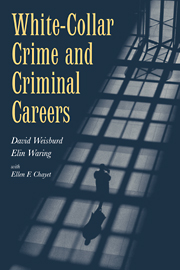Book contents
- Frontmatter
- Contents
- List of Figures
- List of Tables
- Acknowledgments
- Chapter One White-Collar Crime and Criminal Careers
- Chapter Two Dimensions of Official Criminal Careers
- Chapter Three Crimes of Crisis and Opportunity
- Chapter Four Chronic Offenders
- Chapter Five Prison Sanctions and Criminal Careers
- Chapter Six Understanding Recidivism
- Chapter Seven Conclusions
- Appendix A Detailed Information about the Sample
- Appendix B The Imprisonment Model
- References
- Index
Chapter Seven - Conclusions
Published online by Cambridge University Press: 25 June 2009
- Frontmatter
- Contents
- List of Figures
- List of Tables
- Acknowledgments
- Chapter One White-Collar Crime and Criminal Careers
- Chapter Two Dimensions of Official Criminal Careers
- Chapter Three Crimes of Crisis and Opportunity
- Chapter Four Chronic Offenders
- Chapter Five Prison Sanctions and Criminal Careers
- Chapter Six Understanding Recidivism
- Chapter Seven Conclusions
- Appendix A Detailed Information about the Sample
- Appendix B The Imprisonment Model
- References
- Index
Summary
When Edwin Sutherland first introduced the concept of white-collar crime, he sought to add complexity and generality to theories of crime that were all too often focused on a particular type of offender and circumstance. Certainly, he argued, it is incorrect to see crime as a problem unique to the poor and disadvantaged if it can be found in well-off neighborhoods and among those who live in situations of authority and privilege. Obviously, the harms of major stock frauds and the creation of illegal trusts have more long-term impact than the petty offenses of most street criminals. But Sutherland hoped to do more than debunk what had seemed certain about the origins or characteristics of criminality. For Sutherland, the identification of white-collar crime was meant to provide substantive contributions to our understanding of crime, criminality, and the criminal justice system.
In studying the criminal careers of convicted white-collar offenders we have taken an approach consistent with Sutherland's original intention of using the white-collar crime category to explore more general questions in the study of crime and justice. In this concluding chapter, we want to focus directly on three main areas where our work has raised new concerns or intriguing questions. We begin by exploring the ways in which our description of criminal careers in a white-collar crime sample challenges traditional stereotypes of criminals and criminality. We then turn to the implications of our study for understanding involvement in crime.
- Type
- Chapter
- Information
- White-Collar Crime and Criminal Careers , pp. 137 - 156Publisher: Cambridge University PressPrint publication year: 2001



